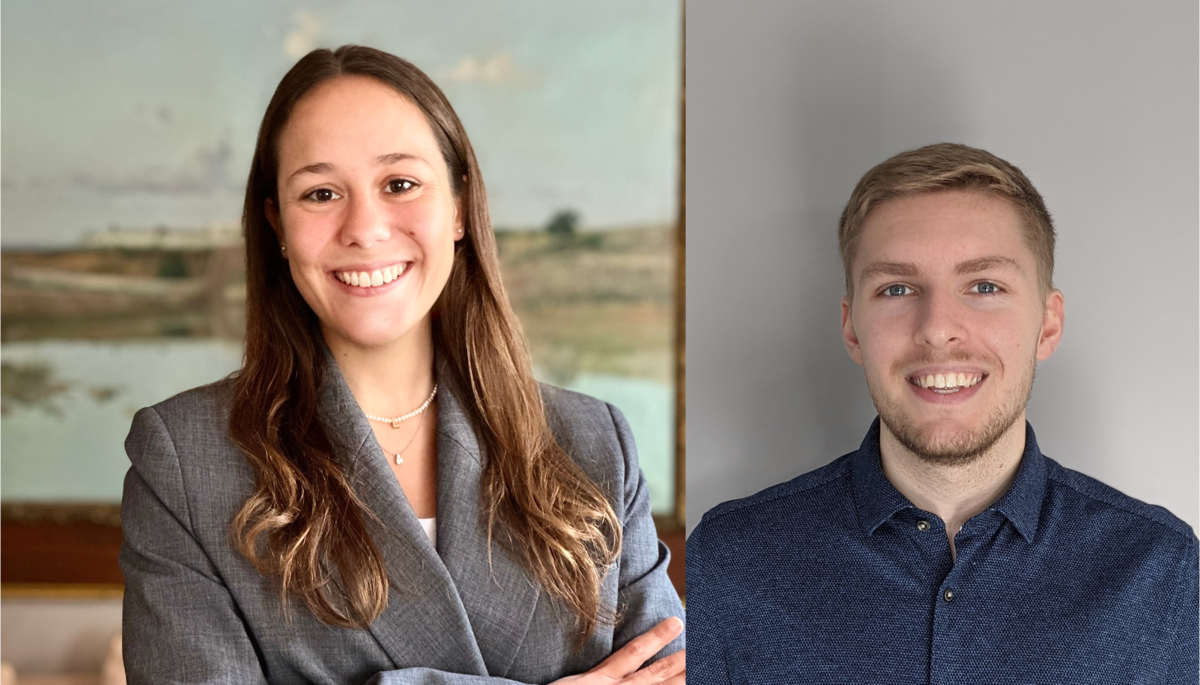
New Members of the DSI Team: Linda Sagnier and Jonas Liebschner
-
Linda Sagnier graduated from the Karlsruhe Institute of Technology (KIT) with a Bachelor’s and Master’s degree in Industrial Engineering and Management. During her master’s studies, she participated in the Service Design Thinking program at KSRI and continued as a teaching assistant until graduating. Focusing on the topic of circular economy, her master's thesis led her to join the Digital Service Design and Innovation Lab in April 2024 as a research associate. Here, she explores circular economy in the context of the project ZirkulEA, particularly focusing on electric powertrains examining intelligent disassembly and traceability.
Jonas Liebschner graduated from the Karlsruhe Institute of Technology (KIT) with a Bachelor's and Master's degree in Information Systems. During his master studies, he worked as a student assistant in the Digital Service Innovation (DSI) research group at KSRI, where he also wrote his master thesis. He joined the DSI research group at KSRI as a research associate in April 2024. As part of the Digital Service Design & Innovation Lab, he is working on SHAPE.
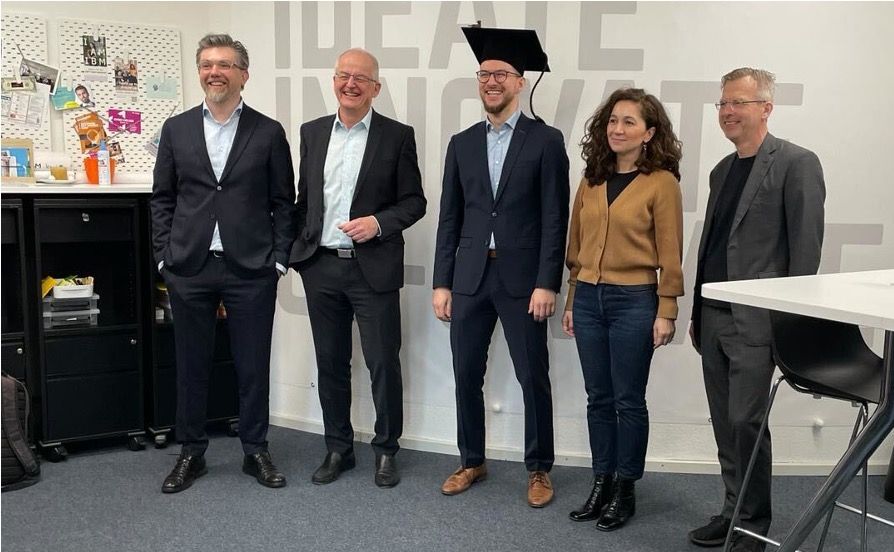
Successful PhD Defense Johannes Jakubik
-
Congratulations to Dr.-Ing. Johannes Jakubik for very successfully defending his thesis on "Data-Centric Artificial Intelligence: Foundations and Methods for Deep Learning" at Karlsruhe Institute of Technology (KIT) this morning!
A big thank you to the examination committee Ali Sunyaev, Sanja Lazarova-Molnar, and Hagen Lindstädt for a very engaged and deep discussion of the thesis!

New Member of the DSI Team: Sebastian Schäfer
-
Sebastian Schäfer graduated from Karlsruhe Institute of Technology (KIT) with a Bachelor’s and Master’s degree in Industrial Engineering and Management. During his master's studies, he started working at KSRI as a frontend developer and junior researcher. In February 2024 he joined the Digital Service Innovation (DSI) research group at KSRI as a research assistant. As part of the Applied AI in Services Lab, he aims to combine UI design and development with his research interest in Human-AI Collaboration to help build services that enable effective interaction and collaboration between humans and AI systems.
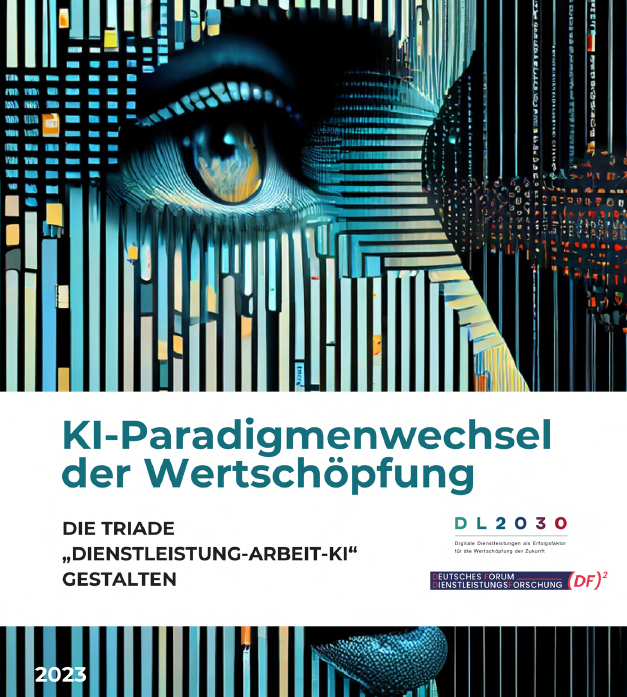
Whitepaper published: AI Paradigm Shift in Value Creation - Shaping the Triad Service - AI - Work
-
Following lively discussions at the Annual Conference of the German Forum for Service Research (DF2) on September 25, 2023, our recently published whitepaper delves into the complex relationship between services, artificial intelligence (AI), and the changing work environment.
During the conference, more than 60 experts from academia and industry collaborated to present a comprehensive exploration of the challenges and opportunities arising from the convergence of AI, services, and the future of work.
The white paper summarizes these discussions into six distinct action areas, highlighting how forward-looking service research can harness the benefits of AI, effectively manage the associated risks, and cultivate societal acceptance.
For an in-depth exploration of these findings and a closer look at the identified action areas, the whitepaper is available for download here.

DSI at the International Conference on Information Systems (ICIS) 2023
-
The Digital Service Innovation research groups of Professor Satzger will be represented with 3 papers at the International Conference on Information Systems, which will take place in Hyderabad, India in December. Congratulations to all authors!
Fassnacht, M., Leimstoll, J., Benz, C., Satzger, G.:
Is Your Organization Ready to Share? A Framework of Beneficial Conditions for Data Sharing
Schemmer, M., Bartosch, A., Spitzer, P., Hemmer, P., Kühl, N., Liebschner, J., Satzger, G.:
Towards Effective Human-AI Decision-Making: The Role of Human Learning in Appropriate Reliance on AI Advice
Sterk, F., Heinz, D., Hengstler, P., Weinhardt, C.:
Reallocating Uncertainty in Incumbent Firms through Digital Platforms: The Case of Google’s Automotive Ecosystem Involvement
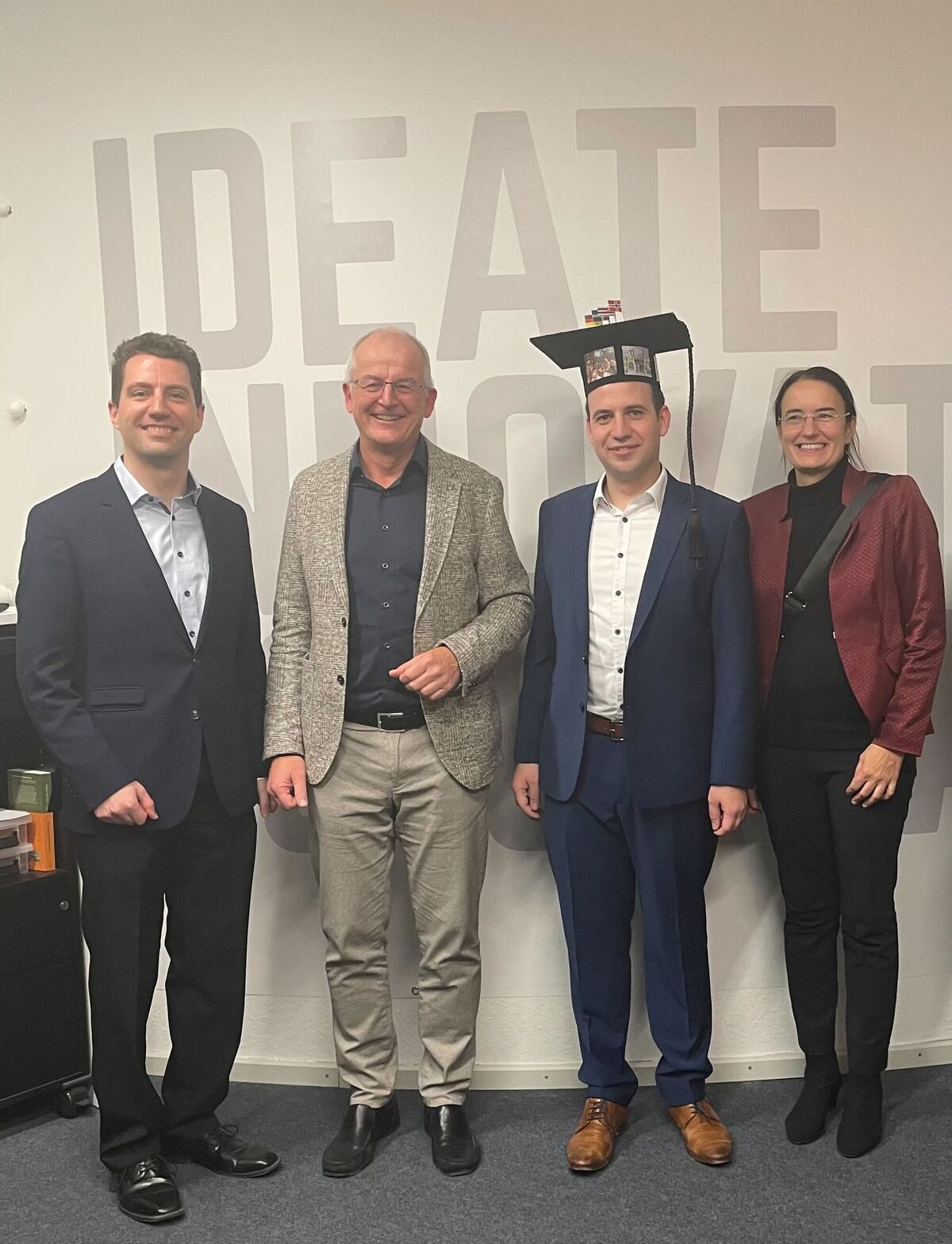
Successful PhD Defense Dominik Martin
-
Congratulations to Dr.-Ing. Dominik Martin for successfully defending his thesis on "Virtual Sensors: Enhancing Sensor Capabilities via Machine Learning across Internet of Things Ecosystems" at Karlsruher Institut für Technologie (KIT).
A big thank you to the interdisciplinary exam committee Michael Färber, Gisela Lanza and Wolf Fichtner - as well as our corporate partner Trelleborg Sealing Solutions for providing super interesting context and data!
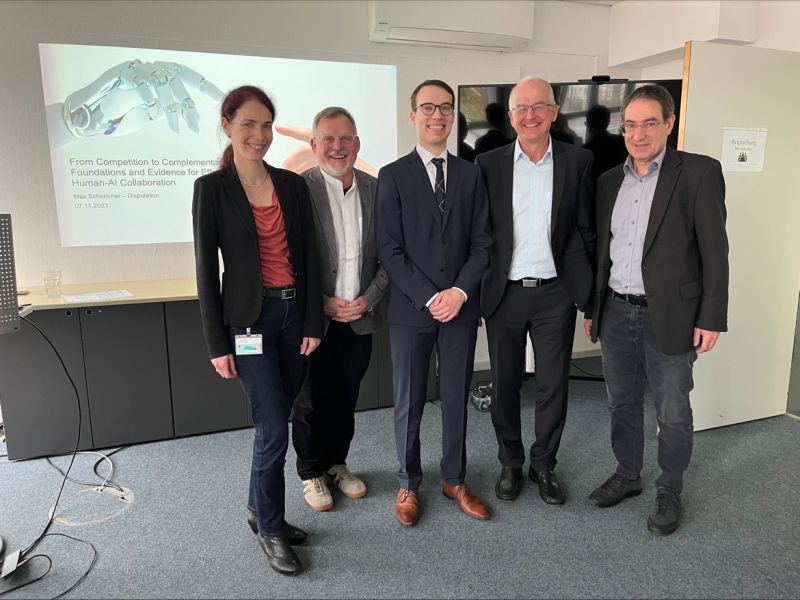
Successful PhD Defense Max Schemmer
-
Congratulations to (now Dr.-Ing.) Max Schemmer for successful defence of his Ph.D. thesis „From Competition to Complementarity: Foundations and Evidence of Effective Human-AI Collaboration“ at Karlsruher Institut für Technologie (KIT) - exciting work and cool contributions to turn a „Human vs. AI“ into a „Human with AI“ discussion.
A big thank you to Andreas Oberweis Christof Weinhardt and Petra Nieken for serving on the examination committee!
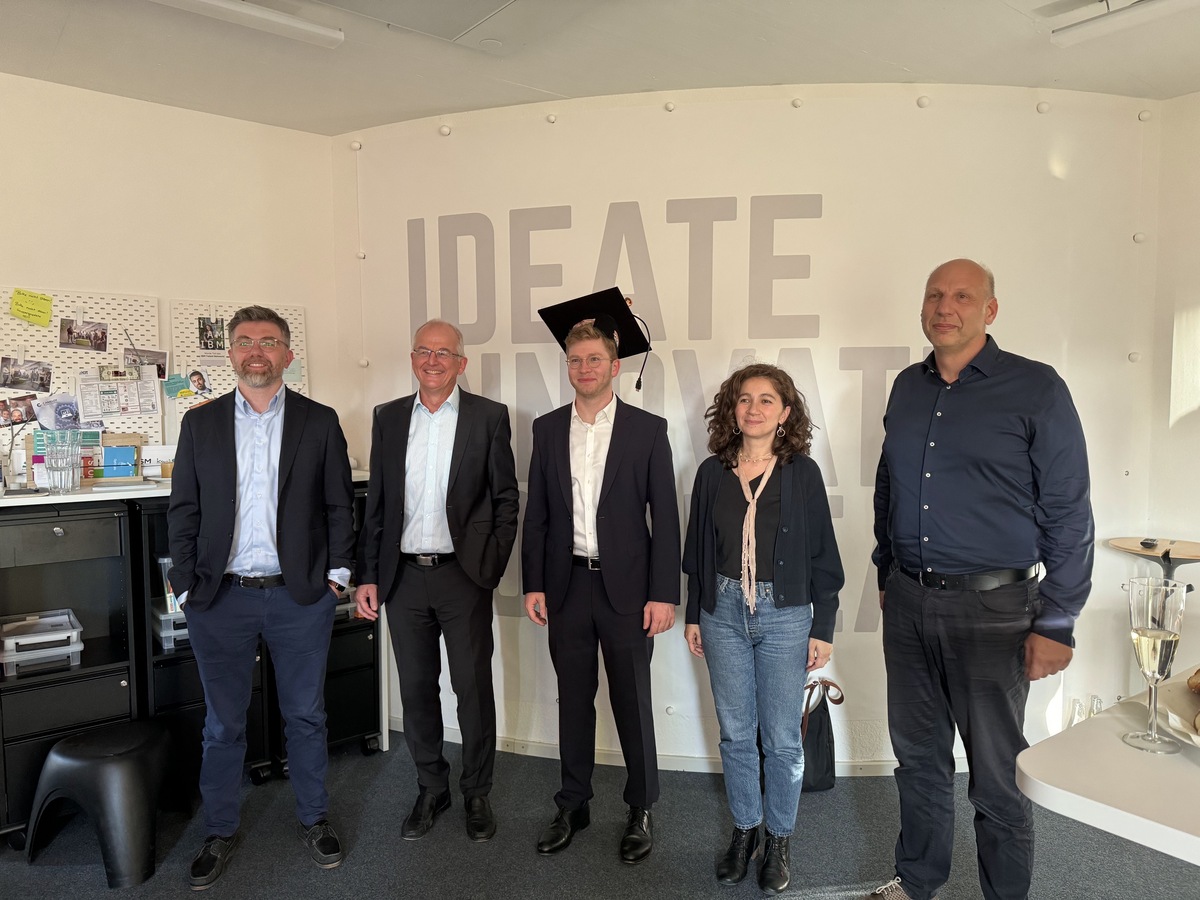
Successful PhD Defense Jakob Schöffer
-
Congratulations to (now Dr.-Ing.) Jakob Schöffer, who successfully defended his PhD thesis “On the Interplay of Transparency and Fairness in AI-Informed Decision-Making” at KIT!
Jakob’s thesis underscores the complex, multidimensional relationship between transparency and fairness in AI systems. In this respect, it sheds light on the often-overlooked limitations of popular transparency mechanisms and emphasizes the discrepancy between desiderata and empirical evidence. By advocating for a reevaluation of transparency as a more comprehensive concept rather than a monolithic notion, Jakob’s findings provide valuable insights for researchers and system designers aiming to create genuinely responsible AI systems.
A big thank you goes to the thesis committee, including Ali Sunyaev, Sanja Lazarova-Molnar, and Stefan Nickel.

New Member of the DSI Team: Patrick Bigge
-
Patrick Bigge graduated from the Duale Hochschule Baden-Württemberg (DHBW) Stuttgart with a Bachelor's degree in Business Informatics, specialising in Data Science. As part of this 3-year co-op programme, he worked with various teams at IBM, ranging from quantum computing to data engineering and AI. The collaboration with the Karlsruhe Service Research Institute (KSRI) started with his bachelor thesis, which was embedded in the field of deep learning in computer science and applied to the construction industry. After graduating, he joins the Digital Service Innovation (DSI) research group as a Junior Researcher. As part of the Applied AI in Services Lab, he continues to work on research projects related to his bachelor thesis. He is also currently working on his Master's degree at the Karlsruhe Institute of Technology (KIT).
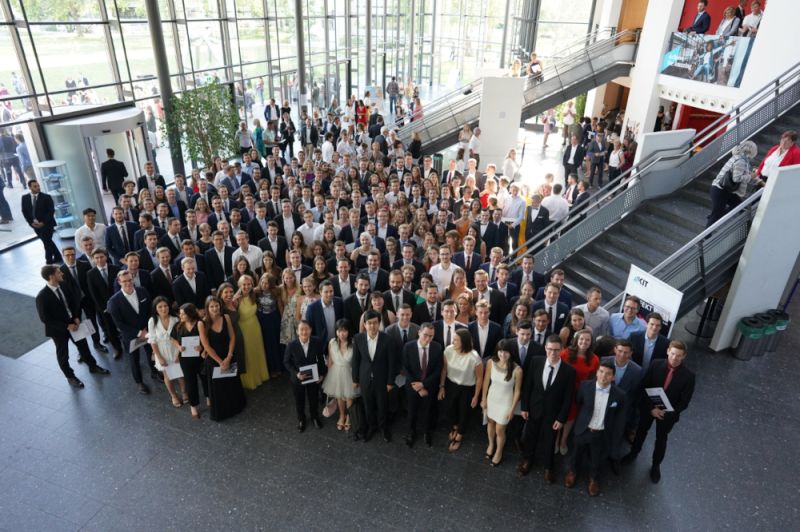
Masters Thesis Award for Lukas Thede
-
Lukas Thede's master's thesis titled "Reducing Human Effort for Training Human-AI Systems" has earned him a Faculty Award at this year's graduation ceremony hosted by the Faculty of Economics and Management. Congratulations to our recent graduate for this outstanding achievement!
His research delves into the intricate dynamics of streamlining the training process for human-AI systems. This topic is of paramount importance in today's technology-driven world, where the collaboration between humans and artificial intelligence is becoming increasingly prevalent.
Lukas' work has been presented at the AAAI '23 conference. Please have a closer look here: https://ojs.aaai.org/index.php/AAAI/article/view/25742

DSI at the Internationale Tagung Wirtschaftsinformatik (WI) 2023
-
The research groups of Professors Mädche, Satzger, and Weinhardt will be represented with 5 papers at the "18th Internationale Tagung Wirtschaftsinformatik (WI)", which will take place in Paderborn, Germany, this September. Congratulations to all authors!
Bluhm, S. / Staudt, P. / Speck, C. / Weinhardt, C. (2023), Ensuring Energy Affordability through Digital Technology: A Research Model and Intervention Design
Heinz, D. / Mingli, H. / Benz, C. / Satzger, G. (2023), Digital Service Innovation for Sustainable Development: A Systematic Literature Review
Jakubik, J. / Weber, D. / Hemmer, P. / Vössing, M. / Satzger, G. (2023), Improving the Efficiency of Human-in-the-Loop Systems: Adding Artificial to Human Experts
Schloss, D. / Gnewuch, U. / Maedche, A. (2023), Towards Designing a NLU Model Improvement System for Customer Service Chatbots.
Seitz, J. / Krisam, C. / Benke, I. (2023), A State of the Art Overview on Biosignal-based User-Adaptive Video Conferencing Systems.
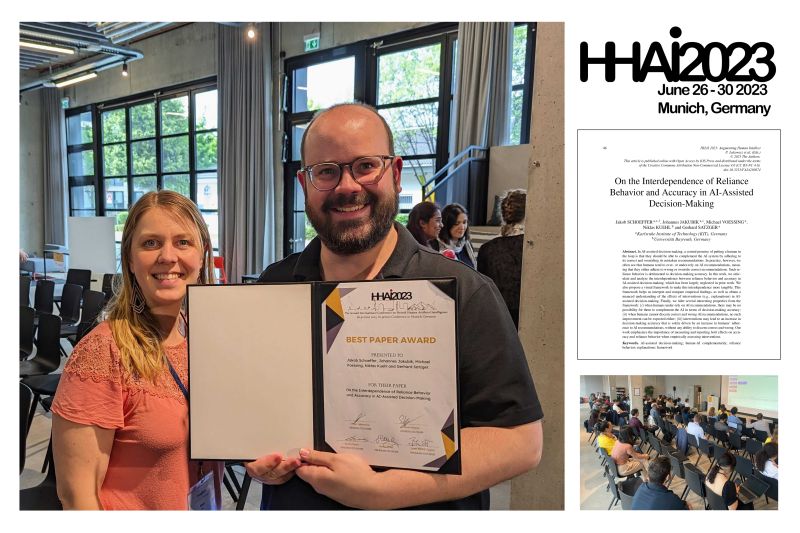
Best Paper Award at HHAI 2023
-
A team of DSI researchers won the best full paper award at this year's International Conference on Hybrid Human-Artificial Intelligence (HHAI) for the paper "On the Interdependence of Reliance Behavior and Accuracy in AI-Assisted Decision-Making". In the paper, the authors formalize and analyze the relationship between reliance behavior and accuracy in scenarios where humans and AI systems are jointly making decisions. The work also includes a visual framework that aims to serve as a blueprint for holistically assessing the effects of explanations and other interventions in human-AI collaboration. Congratulations to the authors, Jakob Schöffer, Johannes Jakubik, Michael Vössing, Niklas Kühl, and Gerhard Satzger!
The full paper is accessible here: https://ebooks.iospress.nl/volumearticle/63322
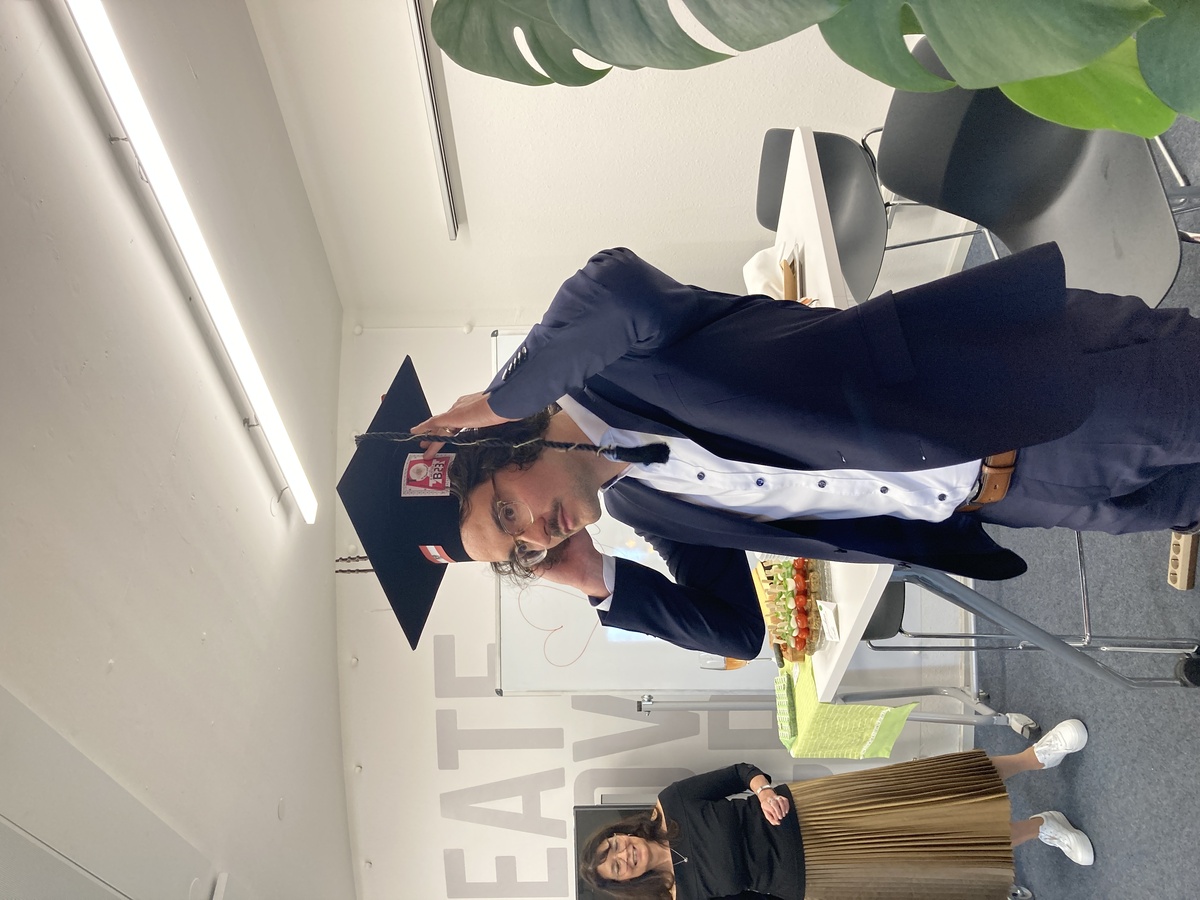
Successful PhD Defense Jannis Walk
-
Congratulations to (now Dr.) Jannis Walk, who has successfully defended his PhD thesis on “Image-based Decision Support Systems: Technical Concepts, Design Knowledge, and Applications for Sustainability” at KIT.
Mining large sets of image data can provide valuable insights that support decisions and form the basis of novel services. In his work, Jannis develops and applies AI-based segmantic segmentation for decision support – in three steps:1. Technical concepts that are required to realize such systems: So, quantifying the uncertainty of AI-based segmantic segmentation helps to identify needs for human support (via additional labelling or via making decisions).
2. Design knowledge: General design principles for such decision support systems are developed and successfully evaluated in real-world settings.
3. Applications for sustainability: It is illustrated how image-based decision support systems enable novel services to reduce ecological footprints of production.
A big thank you goes to the KIT examination committee (including Michael Färber, Frank Schultmann and Andreas Geyer-Schulz) as well as to Plansee Group / CERATIZIT in Reutte/Austria having served as a strong and reliable partner in providing inspiration, data, and evaluation options for the work.
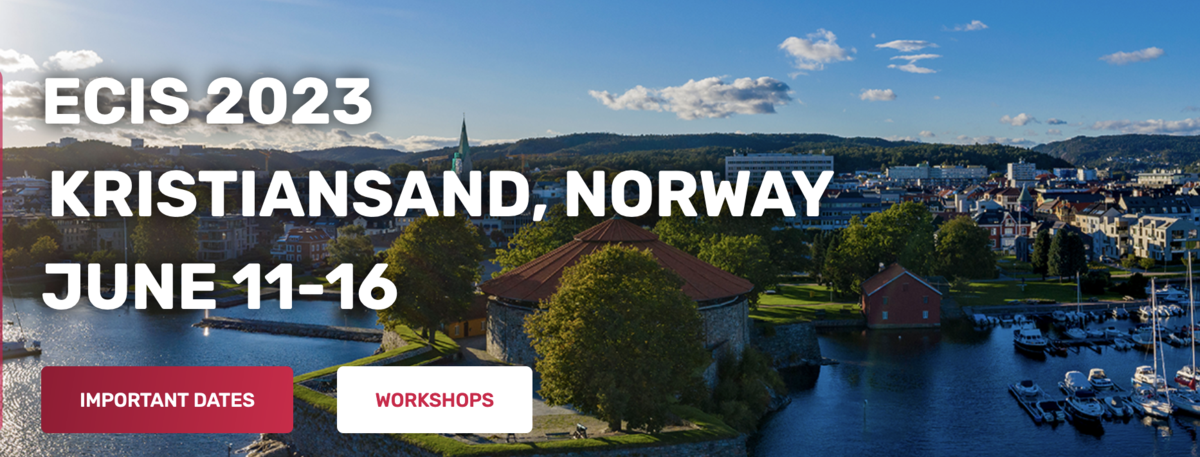
DSI at the European Conference on Information Systems (ECIS) 2023
-
The DSI team will be well represented with 4 papers at the 31st European Conference on Information Systems (ECIS) in Kristiansand / Norway, taking place in June. Congratulations to all authors, and fruitful discussions at the conference!
Particularly noteworthy: A bachelor team coached by Lara Riefle successfully submitted the accomplishments of their practical seminar (“Teamprojekt”) within the curriculum – and two additional papers also include student authors. This demonstrates the capabilities of the students as well as the academic depth of the KIT courses. Well done!
Benz, C.; Oberländer, R.; Riefle, L. (2023): Understanding User Trust Formation on Multi-Sided E-Commerce Platforms
Haller, F.; Schemmer, M.; Kühl, N.; Holtmann, C. (2023): Conceptualizing a Peer-to-peer Cloud Computing Marketplace
Heinz, D.; Anke, J. (2023): Facilitating the Evolution of Methodological Knowledge for Smart Service Innovation
Riefle, L.; Alamo Alonso, S.; Jungnitz, M.; Rothmaier, A.; Wiegand, H.; Zacateco Herrera, R.; Benz, C. (2023): Individualizing Automated Service Delivery: The Example of Chatbot-based Services

Two Papers Presented at AAAI '23
-
Our research group successfully authored and presented two papers at the AAAI '23 conference, held in Washington, DC. AAAI is the premier conference on research on the advancement of artificial intelligence.
In a first paper, Patrick Hemmer et al. propose a solution to a major limitation of "learning to defer" algorithms, which require a large number of human expert predictions to learn whether an AI system should make a prediction itself or defer the decision to a human expert.
Our second paper, led by Jakob Schoeffer et al., in joint collaboration with international scholars from the MD4SG initiative, proposes and analyses the "fair exposure problem", which occurs when online platforms are required to address their users with equal shares of preferred and non-preferred content.
Congratulations to the authors!
Hemmer, P., Thede, L., Vössing, M., Jakubik, J., Kühl, N. Learning to Defer with Limited Expert Predictions
Schoeffer, J., Ritchie, A., Naggita, K., Monachou, J., Finocchiaro, J., Juarez, M. Online Platforms and the Fair Exposure Problem under Homophily
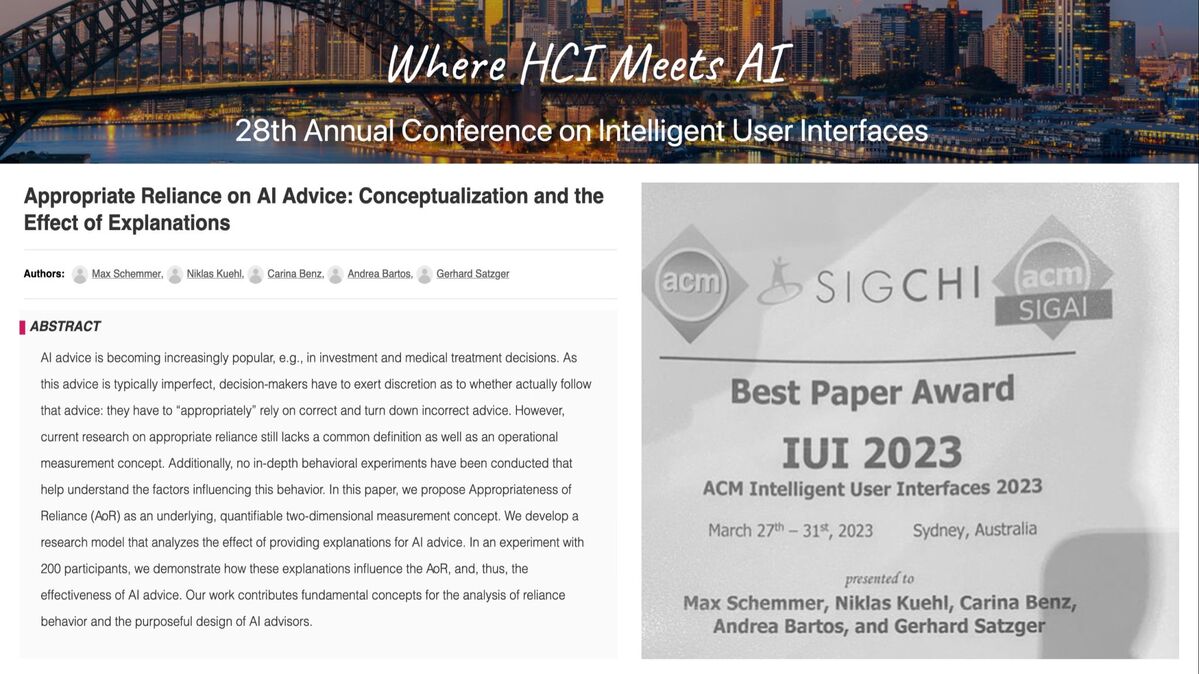
ACM IUI '23: Two Papers Presented & Best Paper Award
-
Our research group successfully authored and presented two papers at the 2023 ACM Conference on Intelligent User Interfaces (IUI), held in Sydney, Australia. IUI is a premier conference on topics at the intersection of HCI and AI research. Our paper "Appropriate Reliance on AI Advice: Conceptualization and the Effect of
Explanations" by Max Schemmer et al. won the best paper award—congratulations to the authors!Hemmer, P., Westphal, M., Schemmer, M., Vetter, S., Vössing, M., Satzger, G. Human-AI Collaboration: The Effect of AI Delegation on Human Task Performance and Task Satisfaction
Schemmer, M., Kühl, N., Benz, C., Bartos, A., Satzger, G. Appropriate Reliance on AI Advice: Conceptualization and the Effect of Explanations
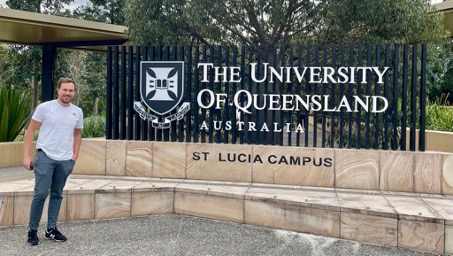
Research Stay at the University of Queensland
-
From October to December 2022, Daniel Heinz visited Australia for a two-month research stay at The University of Queensland with Assoc. Prof. Christoph Breidbach. In addition to the fruitful collaboration with Christoph Breidbach, the time also provided further opportunities for networking and exchange of ideas. Two highlights were the participation in a week of activities of the Service Innovation Alliance, which is a similar interdisciplinary research institution as the KSRI, and the UQ-internal Business Information Systems conference. We look forward to continuing our collaboration with UQ Business School and thank the Karlsruhe House of Young Scientists (KHYS) for providing funding to make the research stay possible.
If you are interested in the research of our collaboration, you might want to check out our recent article on smart service innovation, which we presented at ICIS 2022.
Heinz, D., Breidbach, C., Benz, C., & Satzger, G. (2022). Towards Explaining Smart Service Innovation Events and Trajectories. International Conference on Information Systems 2022. https://www.researchgate.net/publication/364059183_Towards_Explaining_Smart_Service_Innovation_Events_and_Trajectories
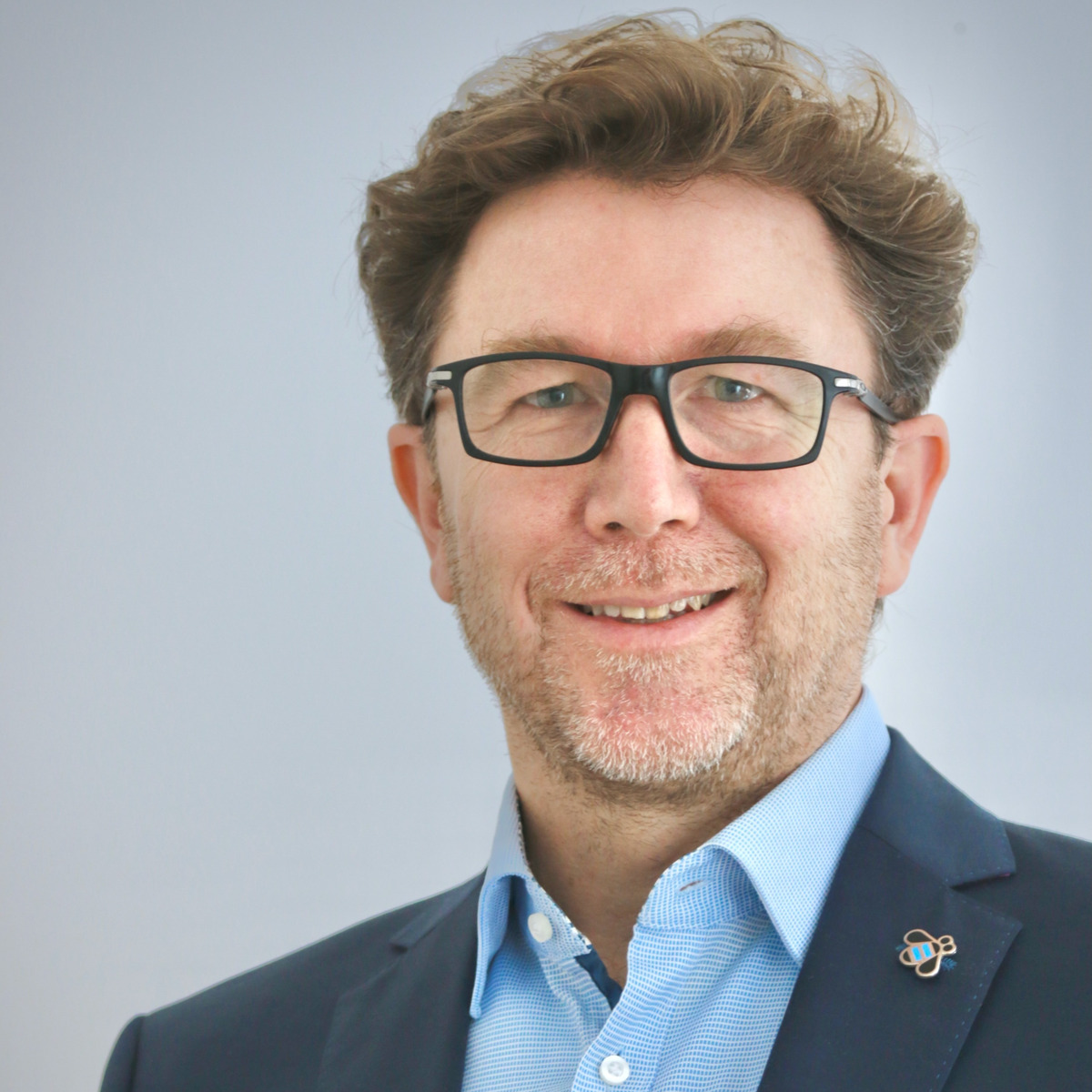
Extended Leadership Team at DSI and KSRI
-
On January 1, 2023, Dr. Carsten Holtmann (LinkedIn) has been joining the KSRI leadership team as a director. He joins Gerhard Satzger co-leading the DSI research team, and will spearhead IBM’s strategic industry-on-campus engagements at KIT.
Carsten is living in Karlsruhe since 1999. He has always been closely connected to the local IT and Science community. He has been working as a researcher, and lecturer at KIT, as business unit leader at FZI, and acting as a strong promotor of networking initiatives amongst local SMEs, industry, and science.
The extended leadership bandwidth underlines IBM’s commitment to the close partnership with KIT and aims at fostering joint endeavors in i.e., services science, AI, and Quantum.
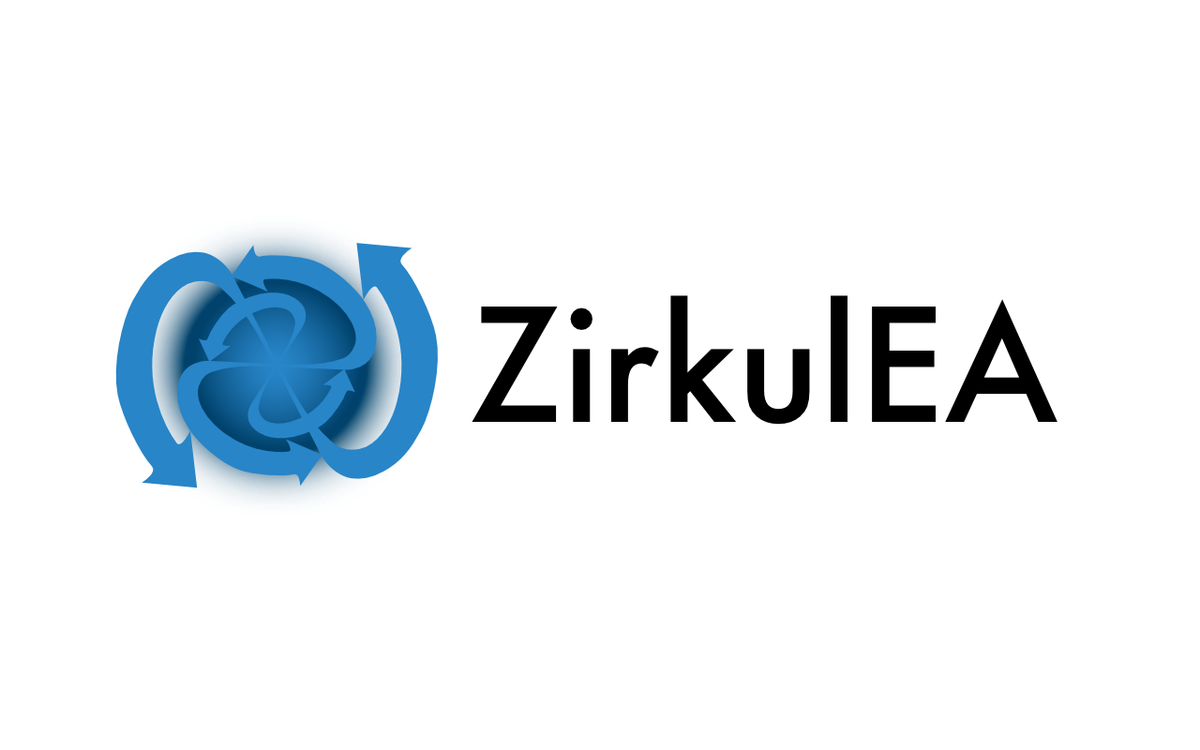
DSI participates in a new project - ZirkulEA
-
Since October 1, 2022, KSRI participates in the new, by the BMBF publicly funded project ZirkulEA. The project was kicked off last Wednesday and Thursday, November 30 to December 1, 2022, with about 30 consortial partners meeting locally in Karlsruhe. The aim of the research project is to design a circular value chain that is as economical as possible with the aid of a comprehensive cross-company exchange of information. This goal is to be illustrated in three exemplary use cases in order to ensure a timely realization of the developed concepts in industrial practice.
As part of the ZirkulEA project, we collaborate with three research institutes and six industry partners to develop research results and practical solutions for a circular economy of the automotive electric powertrain through intelligent disassembly and traceability. Particularly, we focus on the identification and derivation of the necessary information requirements. Suitable technical solutions for data acquisition and data dissemination, as well as software and hardware, will be selected. In addition, an overall concept for data exchange in the form of a partner ecosystem will be developed (including business models and incentive systems for participation).
If you have any questions about the project, please feel free to contact our colleagues Carina Benz, Marcel Fassnacht, Daniel Heinz or .
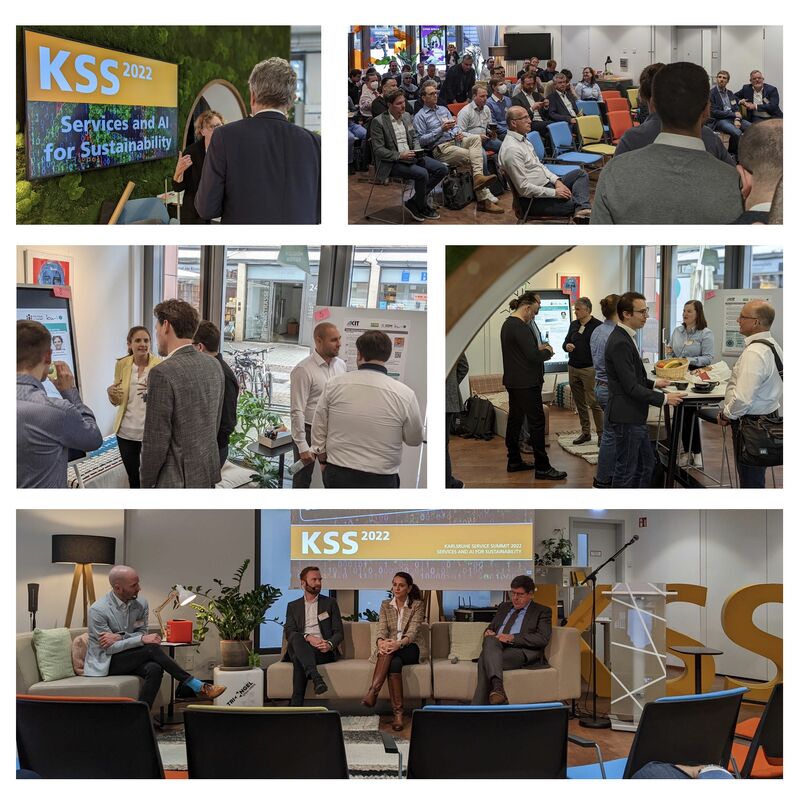
Karlsruhe Service Summit (KSS) 2022
-
On October 14, we had the great honour of inviting to the 8th Karlsruhe Service Summit. The day's theme was "Services and AI for Sustainability", and we were happy to welcome more than 70 participants from research and industry.
This year we were guests in the newly opened TRIANGEL Open Space of the KIT – a unique cultural and innovative space in the heart of Karlsruhe. Based on three themed sessions INSPIRATION - IDEATION - INNOVATION, KSRI researchers, industry experts and startups shared their impulses and discussed the potential of digital services and AI for society and business and the enhancement of sustainable development. Many thanks to keynote speakers Marc Peters and Michel Weinketz and discussion panel participants Susanne Hahn, Thomas Hirth and Anton Baranowski! Thanks also to the numerous PhD Candidates from KSRI's network for their excellent research pitches and the 1:1 discussions throughout the day.
We enjoyed the day very much and look forward to further active exchanges with our community.

Participation of DSI @HICSS 2023
-
Our research group successfully authored three papers at the “Hawaii International Conference on System Sciences (HICSS-56)”. The papers will be presented by the authors at the conference at Kaanapali (Maui), from January 3 to January 6, 2022. Congratulations to all authors!
Baier, L., Schlör, T., Schöffer, J., Kühl, N.
Detecting Concept Drift With Neural Network Model Uncertainty
Fassnacht, M., Benz, C., Heinz, D., Leimstoll, J., Satzger, G.
Barriers to Data Sharing among Private Sector Organizations
Geiger M., Martin, D., Kühl, N.
Deep Domain Adaptation for Detecting Bomb Craters in Aerial Images
For further information feel free to contact the authors directly.
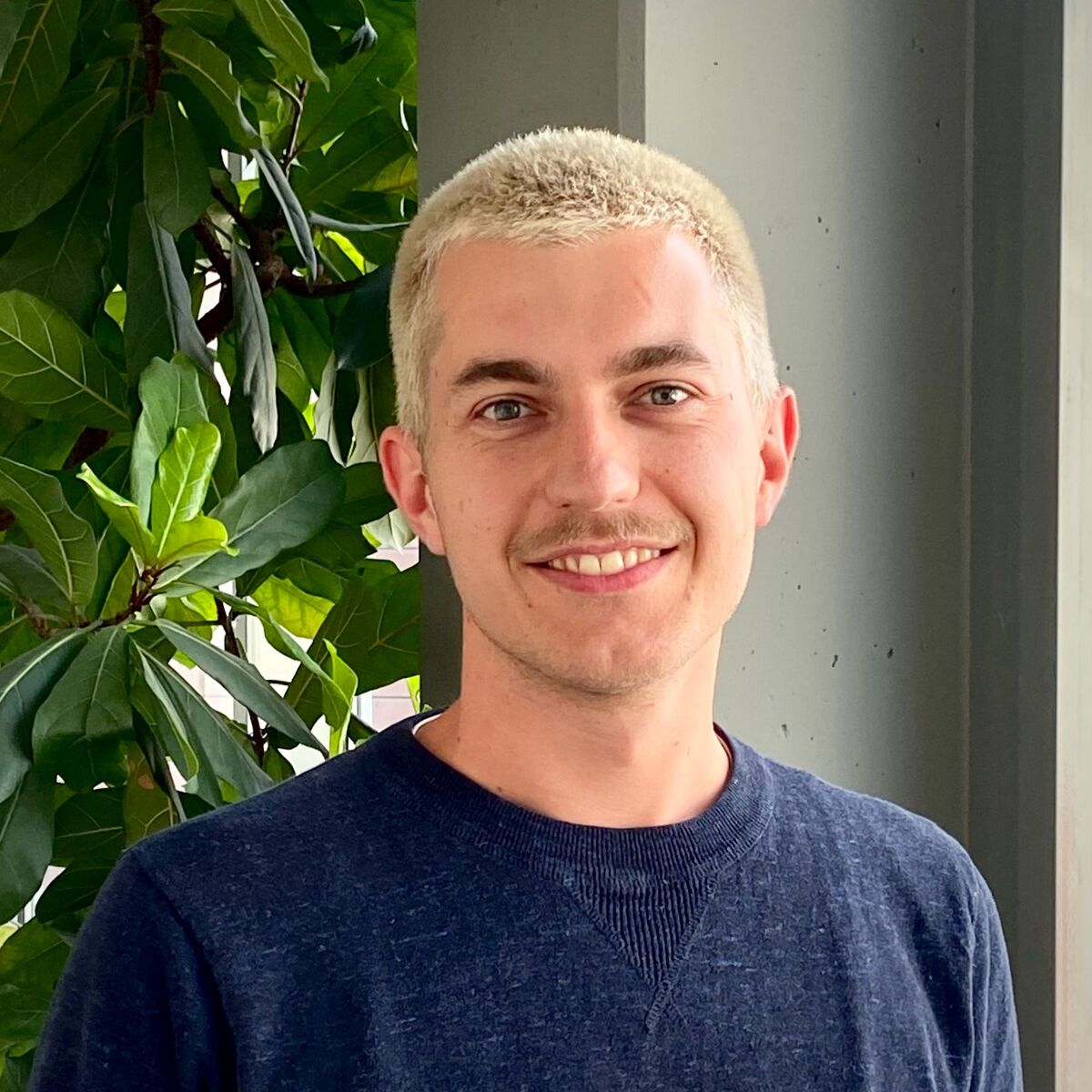
New Member of the DSI Team: Jannis Leimstoll
-
is studying Industrial Engineering at the Karlsruhe Institute of Technology (KIT). After his Bachelor’s degree, he continued his Master's studies at KIT with a focus on digital service management and innovation economics. Additionally, he spent a semester abroad at the Tallinn University of Technology in Estonia and worked as a student assistant at the KSRI’s DSI team. As a Junior Researcher of the DSI team, he will work on topics related to Data Sharing, Data Trading & Data Ecosystems in the Circular Economy context and research the potential of their application in practical industry scenarios.
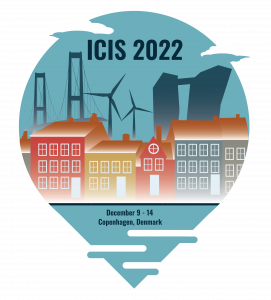
DSI at the International Conference on Information Systems (ICIS) 2022
-
The research group Digital Service Innovation of Professor Satzger will be represented with 4 papers at the International Conference on Information Systems, which will take place in Copenhagen in December. Congratulations to all authors!
Heinz, D., Breidbach, C.F., Benz, C., Satzger, G.: Towards Explaining Smart Service Innovation Events and Trajectories.
Riefle, L., Benz, C., Tomar, T.: "May I Help You?": Exploring the Effect of Individuals' Self-Efficacy on the Use of Conversational Agents
Riefle, L., Hemmer, P., Benz, C., Vössing, M., Pries, J.: On the Influence of Cognitive Styles on Users’ Understanding of Explanations
Sterk, F., Heinz, D., Peukert, C., Fleuchaus, F., Koelbel, T., Weinhardt, C.: Fostering Value Co-Creation in Incumbent Firms: The Case of Bosch’s IoT Ecosystem Landscape.
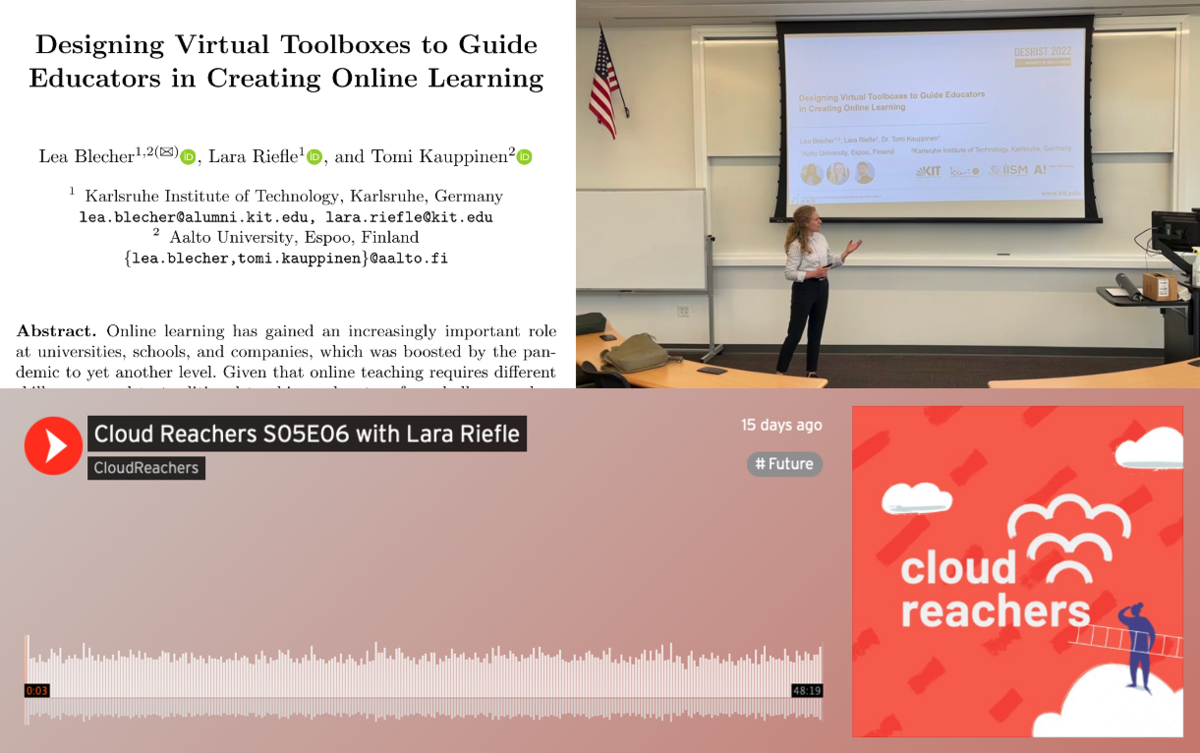
Research Collaboration with Tomi Kauppinen from Aalto University
-
An interdisciplinary team from the DSI research group at KIT and Aalto Online Learning at Aalto University (Finland) collaborated on a research project about online learning. In particular, the project aimed at providing educators guidance in creating online learning courses. Therefore, the team consisting of Lea Blecher (Master’s student @KIT), Tomi Kauppinen (head of Aalto Online Learning), and Lara Riefle (researcher @KIT) used a design science research approach and developed and evaluated a digital toolbox that interactively presents best practices and implementation guidelines for online learning practices.
Today, the resulting toolbox is integrated into Aalto’s teaching resources and helps educators create high-quality online courses.
Explore the toolbox: https://learningtoolbox.aalto.fi/recommendations-and-pre-loved-practices/
Get to know the research approach: https://www.researchgate.net/publication/360464598_Designing_Virtual_Toolboxes_to_Guide_Educators_in_Creating_Online_Learning
Inspired by discussions during the collaboration, Tomi also invited Lara to be a guest in his Cloud Reachers podcast. The podcast episode not only covers topics around the future of learning, but also discusses Lara’s research and thoughts around the topic of human-AI collaboration.
Listen to the podcast: https://soundcloud.com/user-705936595/cloud-reachers-s05e06-with-lara-riefle
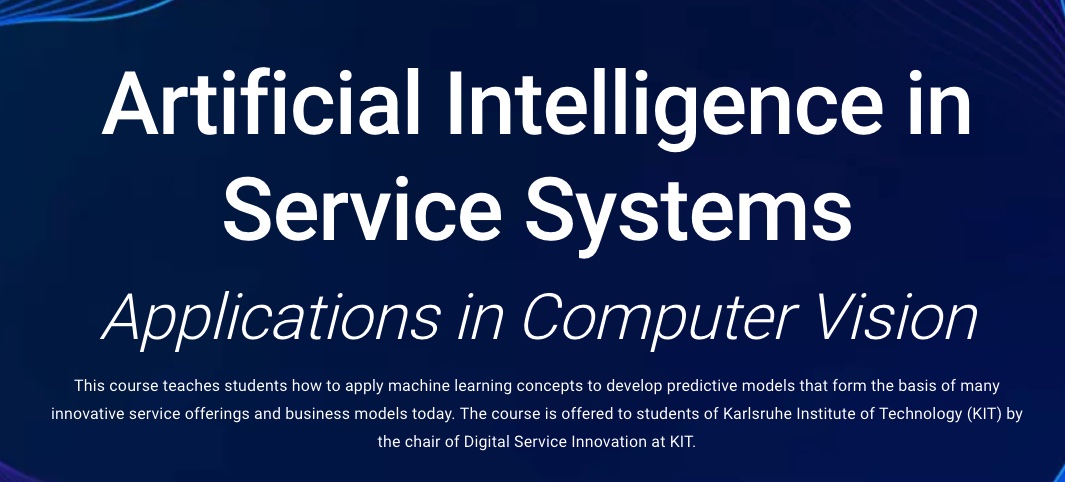
Student Projects in "AI in Service Systems – Applications in Computer Vision"
-
This year’s student projects as part of the course on Artificial Intelligence in Service Systems - Applications in Computer Vision ended with various exciting presentations from the student teams on July, 31st. The topics ranged from computer vision-aided improvements in recycling over detecting diseases in wine yards to preserving privacy in video streams.
In the course, we teach the theoretical foundations of selected machine learning algorithms (e.g., convolutional neural networks) and development concepts (e.g., developing modeling, training, inference pipelines) and teach how to apply these concepts to build a functioning prototype of an analytics-based service (e.g., inference running on a device). During the course, students work in small groups to apply the learned concepts in the programming language Python using packages such as Keras, Tensorflow or Scikit-Learn. For more information on the course and this year’s students’ projects, please visit https://www.aiss-cv.com.
Special thanks to lecturer Björn Schmitz and the teaching team including Philipp Spitzer and Johannes Jakubik. Looking forward to the course next year!
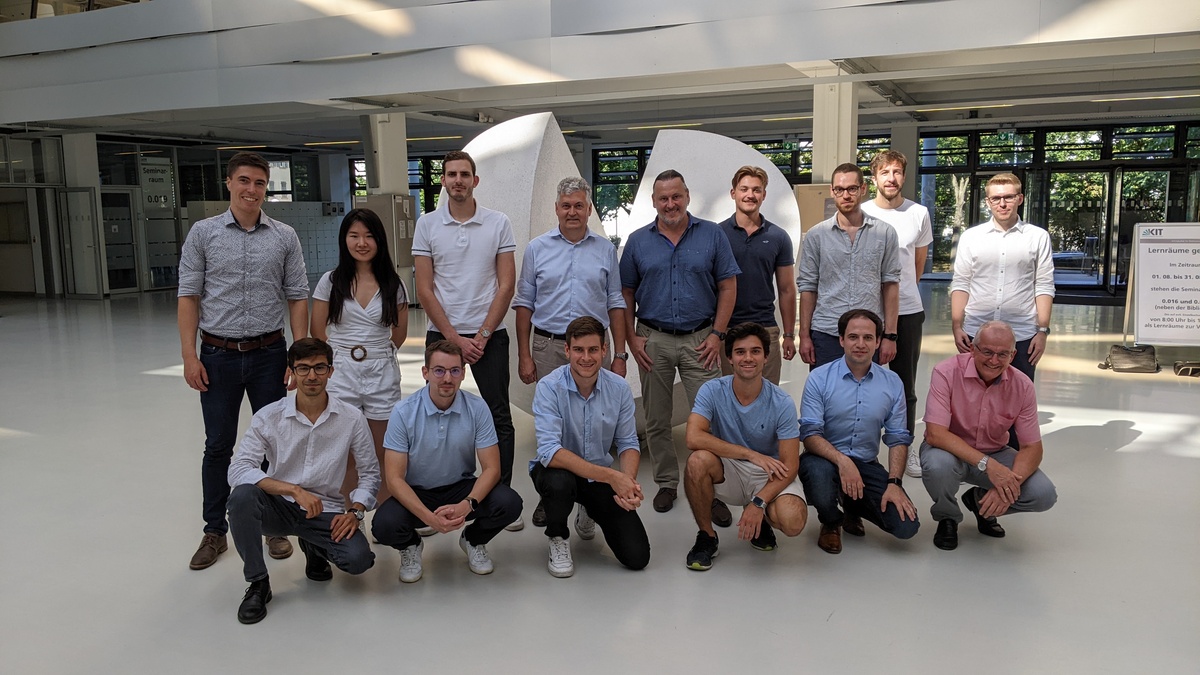
Seminar Presentations on Data Science for the Industrial Internet of Things
-
Just recently, we hosted the final presentations of the practical seminar "Data Science for the Industrial Internet of Things" at KIT. For the fifth year now already the seminar is organized with our cooperation partner Trelleborg.
We had the pleasure to welcome our partners from Trelleborg, who provided four interesting real-world use-cases from domains like Engineering, Manufacturing and Sales. Students from the field of industrial engineering, business informatics and computer science applied their skills from data science and applied machine learning on those datasets to develop prototypes that generate great insights and help improve business processes.
Special thanks to Professor Satzger and Alexander Jarosch, Michael Fryczewski and Dominik Martin from Trelleborg, who provided valuable feedback to the students and made this event truly terrific.
Looking forward to the seminar next year!

Paper Accepted at AAAI ICWSM 2023
-
The paper "Online Emotions During the Storming of the U.S. Capitol: Evidence from the Social Media Network Parler" has been accepted for presentation at the International AAAI Conference on Web and Social Media (AAAI ICWSM 2023). This project was conducted by Johannes Jakubik, Michael Voessing, Nicolas Proellochs (JLU Giessen), Dominik Baer (LMU Munich) and Stefan Feuerriegel (LMU Munich).
In this work, the authors examine the emotion dynamics on Parler during the storming of the U.S. Capitol on January 6, 2021 with regard to heterogeneity across time and users. The evaluation is based on a large-scale dataset from Parler, comprising of 717,300 posts from 144,003 users. The results indicate that the user base responded to the storming of the Capitol with an overall negative sentiment. Moreover, the study provides a cross-platform analysis and compares the emotion dynamics on Parler and Twitter. The findings point at a comparatively less negative response to the incidents on Parler compared to Twitter accompanied by higher levels of disapproval and outrage.
Congrats to the authors!
Link to the paper: https://arxiv.org/pdf/2204.04245.pdf
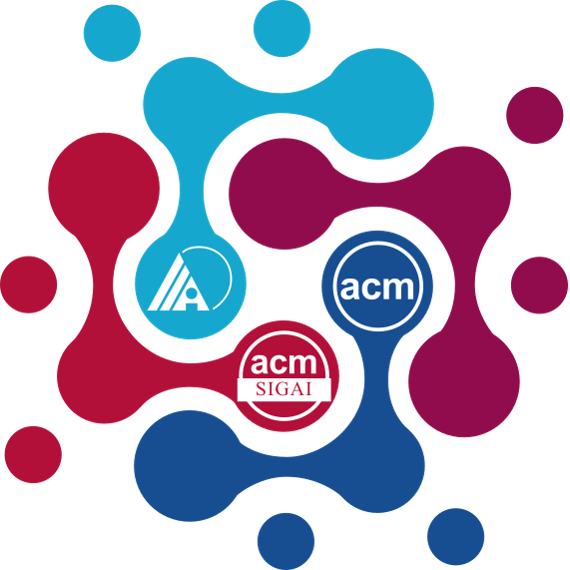
Paper Presentation at AIES 2022 in Oxford
-
Patrick Hemmer presented the paper "A Meta-Analysis of the Utility of Explainable Artificial Intelligence in Human-AI Decision-Making" at the AAAI/ACM Conference on AI, Ethics, and Society (AIES 2022) in Oxford. The project was joint work with Max Schemmer, Maximilian Nitsche, Niklas Kühl and Michael Vössing.
The paper presents an initial synthesis of existing research that conducted user studies analyzing the effect of explainable artificial intelligence (XAI) assistance on human decision-making performance using a statistical meta-analysis. The analysis reveals a statistically positive impact of XAI assistance on users' performance. In this context, human-AI decision-making tends to yield better task performance on text data compared to tabular data. However, in the analysis, no effect of explanations on users' performance compared to sole AI predictions can be identified. These results give rise to future research investigating the underlying causes and contribute to further developing algorithms that effectively benefit human decision-makers by providing meaningful explanations.
Congrats to the authors!
You can download the paper here: https://dl.acm.org/doi/10.1145/3514094.3534128
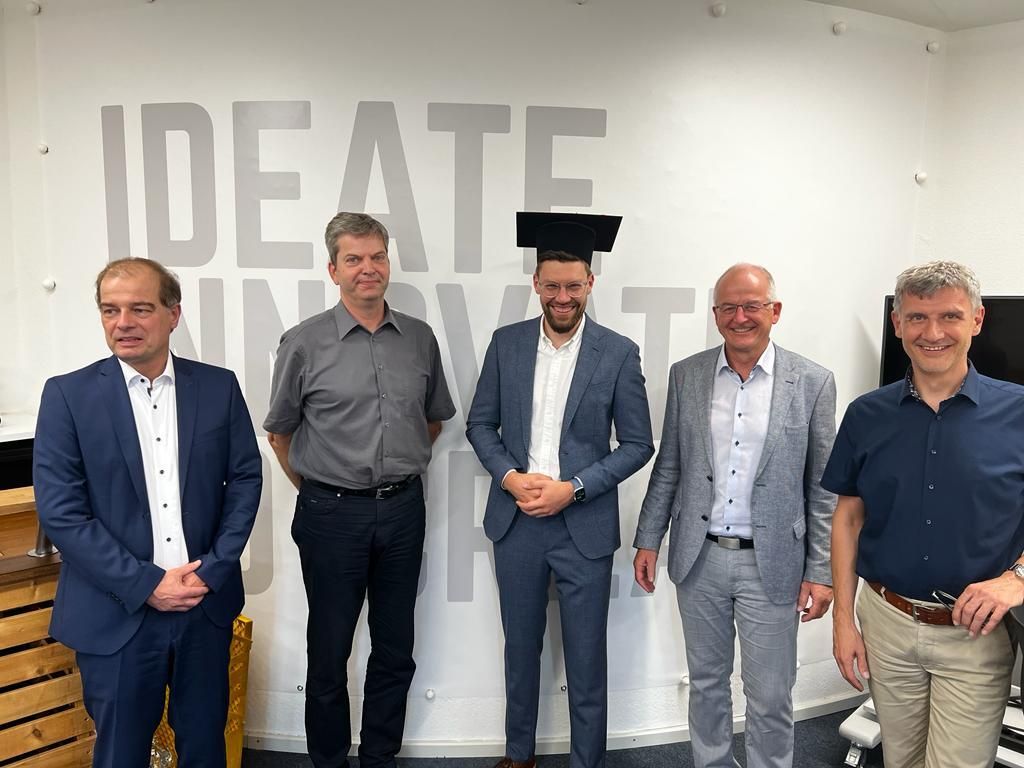
Fabian Hunke PhD Defense
-
Congratulations to Dr. Fabian Hunke for successfully completing his dissertation on "Analytics-Based Services: Conceptualization and Design Support" — probably the first defense where "Überraschungseier" were used as demonstration objects :-). A big thank you goes to the dissertation committee Orestis Terzidis, Wolf Fichtner, and Marc Wouters for — thanks to summerly weather — truly "heated" discussions...
Fabian, thanks for all your contributions to our group, and all the best of luck for the start into your professional life (directly applying what you have worked on at KIT!).
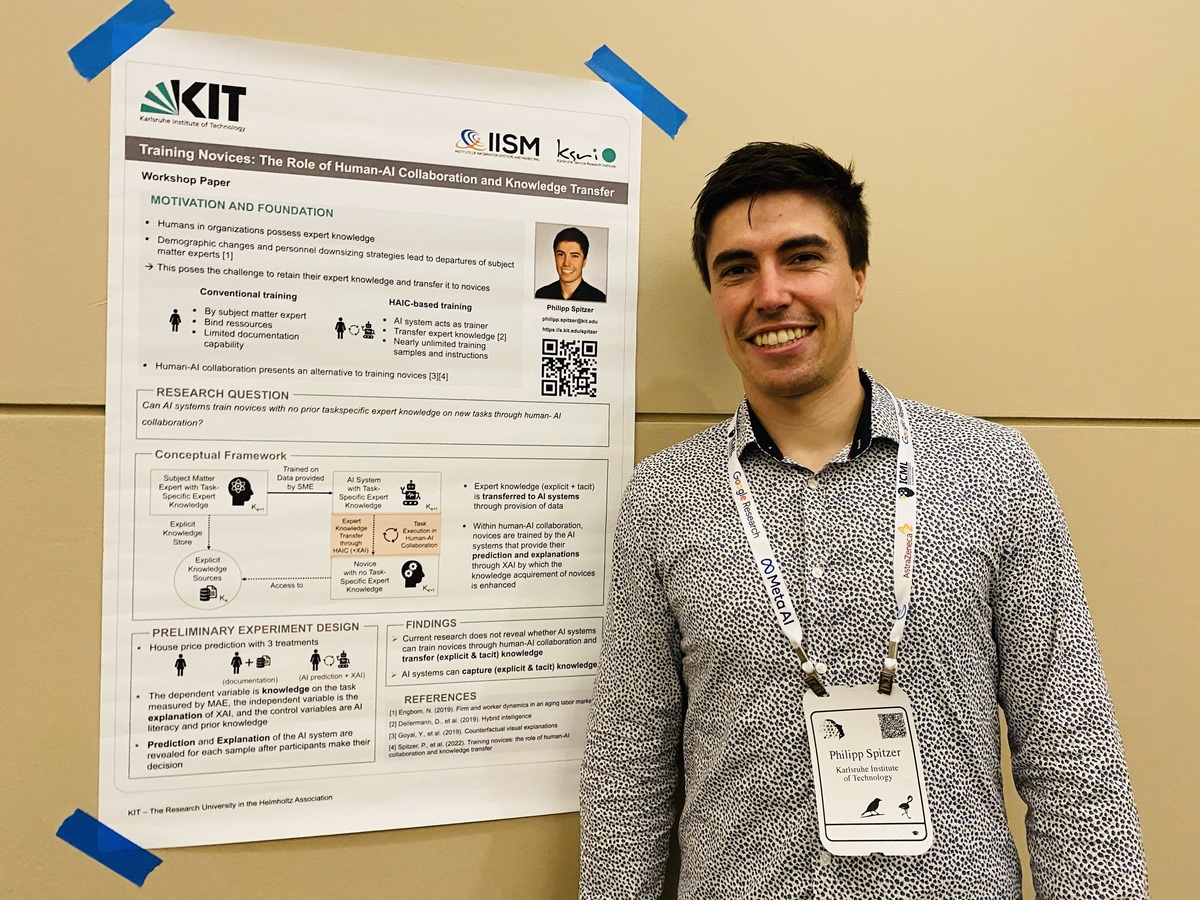
Workshop Paper at ICML 2022
-
Just recently, Philipp Spitzer had the opportunity to present his paper on “Training Novices: The Role of Human-AI Collaboration and Knowledge Transfer” at the Human-Computer Collaboration and Teaming Workshop at ICML 2022 (International Conference on Machine Learning) in Baltimore, USA. With the increasing significance of knowledge within organizations, Niklas Kühl, Marc Goutier and Philipp outline how human-AI collaboration can be utilized to train novices on new tasks. Specifically, we conceptualize in a framework the different knowledge forms (explicit and tacit) in training novices through AI systems and outline a preliminary experiment design to investigate the capability of AI systems to be used as a trainer.
Congrats to the authors!
Link to the paper: https://arxiv.org/abs/2207.00497

Paper Presentation at IJCAI-ECAI 2022 in Vienna
-
Patrick Hemmer, Michael Vössing, and Sebastian Schellhammer presented the paper “Forming Effective Human-AI Teams: Building Machine Learning Models that Complement the Capabilities of Multiple Experts” at the 31st International Joint Conference on Artificial Intelligence (IJCAI-ECAI 2022) in Vienna, Austria. The project was joint work with Johannes Jakubik and Gerhard Satzger.
In the paper, the authors showcase a system that facilitates the collaboration between humans and artificial intelligence. It consists of a classifier trained to complement the strengths and weaknesses of multiple human experts and an allocator that assigns task instances to the most suitable team member—either the classifier or one of the human experts. The proposed approach is evaluated in multiple experiments on public datasets with “synthetic” experts and a real-world medical dataset annotated by multiple radiologists. The system outperforms prior work and is more accurate than the best human expert or the classifier. Furthermore, it is flexibly adaptable to teams of varying sizes and different levels of human expert diversity.
Congrats to the authors!
You can download the paper here: https://www.ijcai.org/proceedings/2022/344
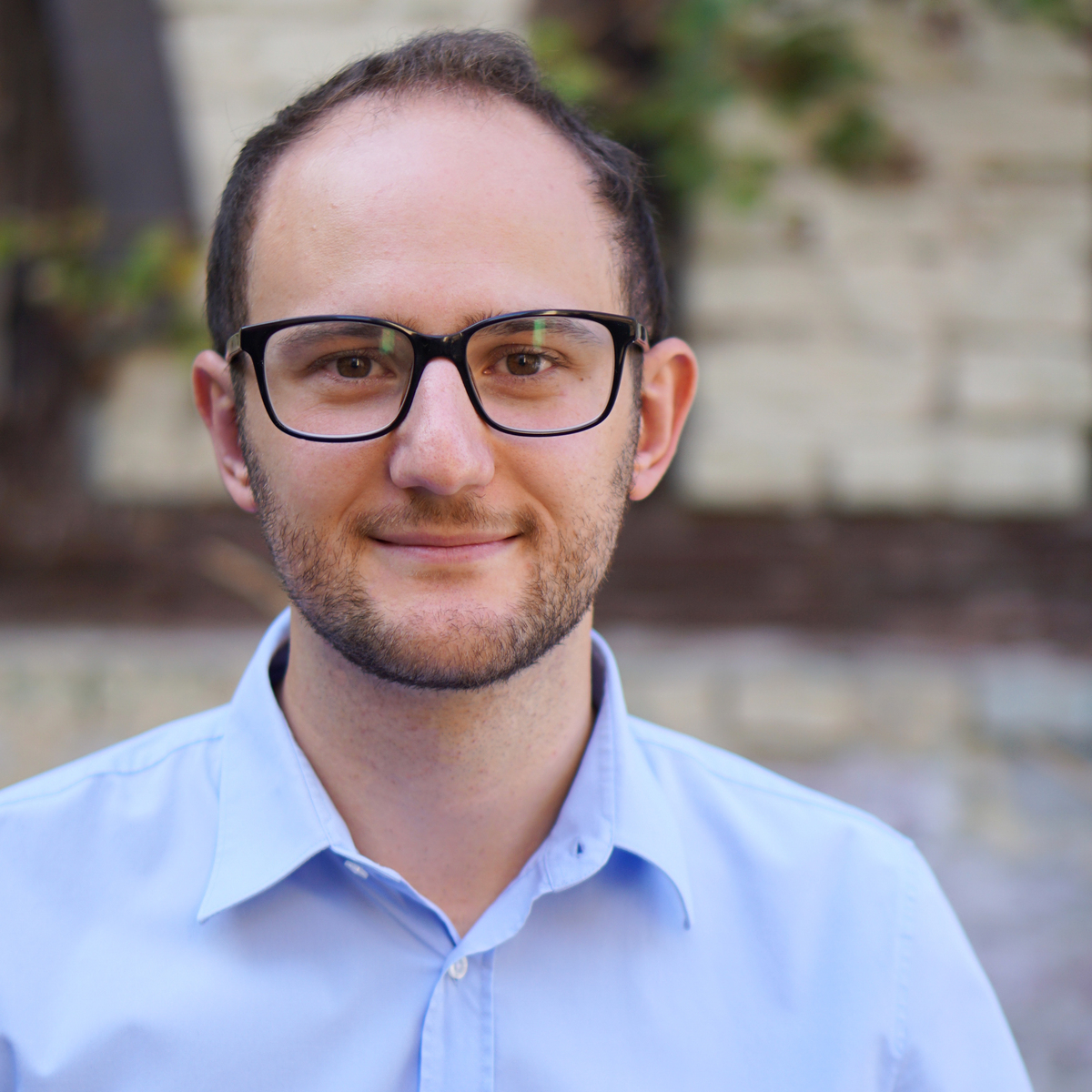
New Member of the DSI Team: Joshua Holstein
-
During his Bachelor’s degree Joshua Holstein studied industrial engineering with a focus on mechanical engineering at the Technical University Darmstadt. Afterward, he earned his Master’s Degree at the Karlsruhe Institute of Technology (KIT) in Industrial Engineering and Management. As part of his studies, he spent a semester abroad at Reichman University in Herzliya (Israel). After finishing his master thesis at the Bayer AG, he joined the Applied AI lab of the Digital Service Innovation Group in July 2022 as a research asscociate. During his joined PhD with the Bayer AG, he researches how to lever data-centric AI methods in industrial settings such as manufacturing.
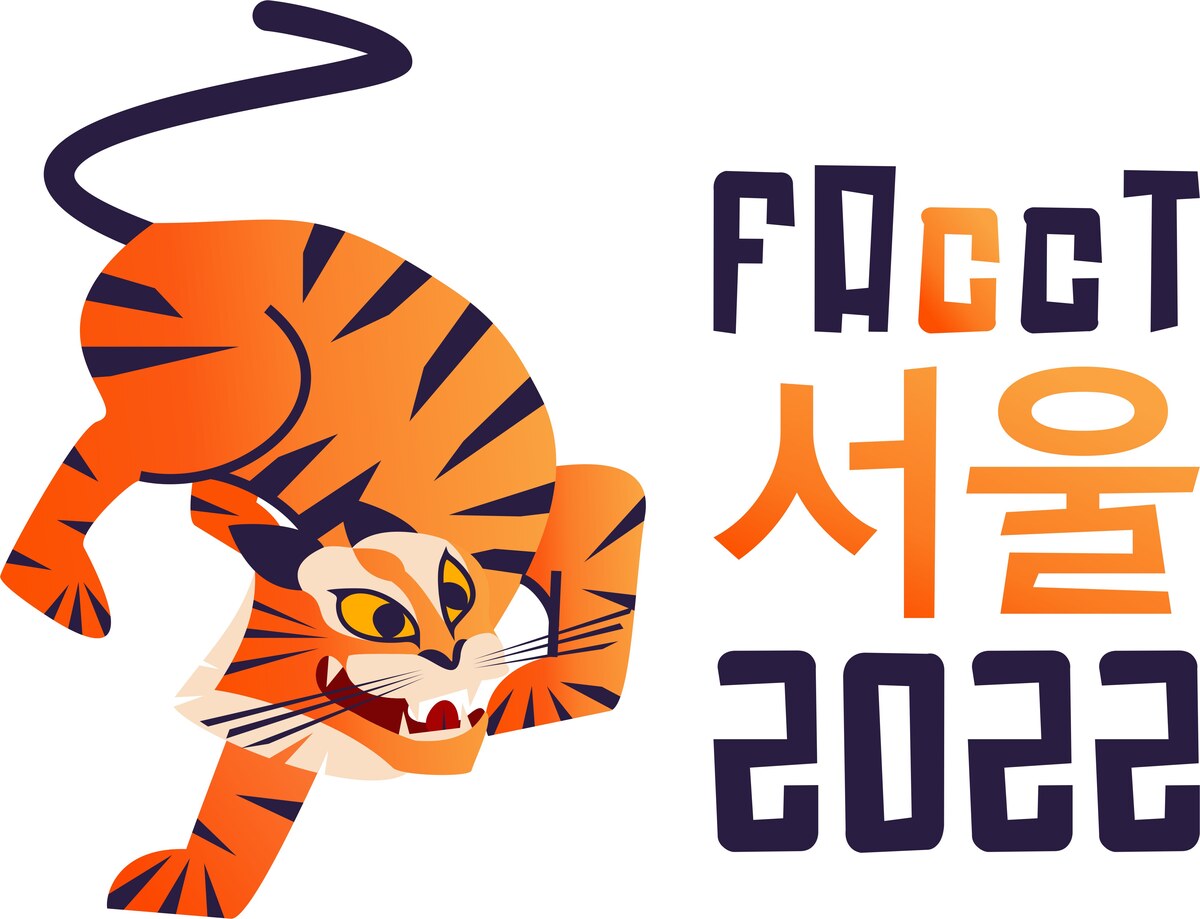
Paper Presentation at ACM FAccT '22
-
In June, Jakob Schoeffer presented the paper "There is not enough information": On the effects of explanations on perceptions of informational fairness and trustworthiness in automated decision-making at this year's ACM FAccT '22 conference in Seoul, Korea—the premier conference on topics related to fairness, accountability, and transparency in AI-based systems. This was joint work with Niklas Kuehl and Yvette Machowksi.
In this work, the authors conducted a human subject study to assess people’s perceptions of informational fairness (i.e., whether people think they are given adequate information on and explanation of the decision-making process and its outcomes) and trustworthiness of an automated lending system when provided with varying types and amounts of information about the system. From their quantitative analyses, they observe that different amounts of information as well as people’s (self-assessed) AI literacy significantly influence the perceived informational fairness, which, in turn, positively relates to perceived trustworthiness of the given system. A comprehensive analysis of qualitative feedback sheds light on people’s desiderata for explanations, among which are (i) consistency (both with people’s expectations and across different explanations), (ii) disclosure of monotonic relationships between features and outcome, and (iii) actionability of recommendations.
Congrats to the authors!
Link to the paper: https://arxiv.org/pdf/2205.05758.pdf
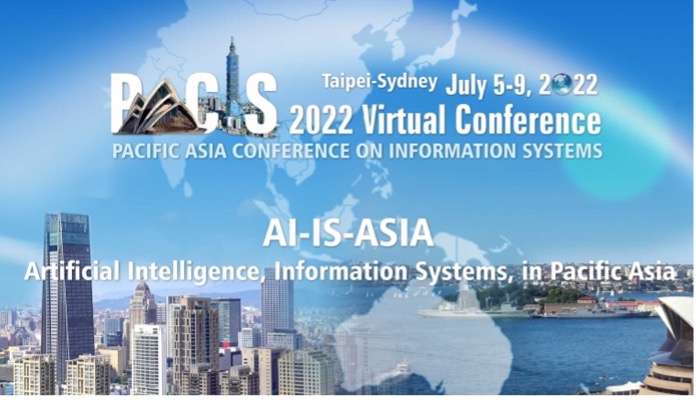
Participation of DSI @PACIS 2022
-
Our research group successfully authored two papers at the “26th Pacific Asia Conference on Information Systems (PACIS) 2022”. The authors will present their papers (see below) at the virtual conference from July 5 to July 9, 2022. Congratulations to all authors!
Heinz, D., Benz, C., Fassnacht, M., Satzger, G.:
Past, Present, and Future of Data Ecosystems Research: A Systematic Literature Review
Enders, T., Satzger, G., Fassnacht, M., Wolff, C.:
Why Should I Share? Exploring Benefits of Open Data for Private Sector Organizations
For further information feel free to contact the authors directly.

Publication of Initial Results of Research Project “bi.smart” at International Conferences
-
Smart product-service systems (sPSS) offer the opportunity to create additional value for all stakeholders involved. However, organizations often lack the resources, expertise, and practical guidance to develop, deploy, and maintain such complex solutions. With two publications, researchers of our research group “digital service innovation” address this topic. The studies are a result of the publicly funded “bi.smart” project.
[1] Heinz, D.; Park, H.-R.; Benz, C.; Satzger, G. (2022). Innovating Smart Product-Service Systems in Manufacturing SMEs: Current Practices, Affordances, and Constraints. In 24th IEEE Conference on Business Informatics (IEEE CBI 2022). (https://go.wiwi.kit.edu/bismart-cbi-2022)
How do small and medium-sized enterprises experience the potential of emerging technologies for the innovation and implementation smart product-service systems? What are the current barriers of adopting these technologies? This is the subject of this article, which will be published at the Conference of Business Informatics (CBI) in Amsterdam.
[2] Heinz, D., Benz, C., Silbernagel, R., Molins, B., Satzger, G., Lanza, G. (2022). A Maturity Model for Smart Product-Service Systems. Procedia CIRP, 107, pp. 113-118. (https://doi.org/10.1016/j.procir.2022.04.019).
In the second article, the researchers build a maturity model for smart product-service systems that spans various dimensions - including technical enablers, the realization of value, and the integration into business. The research combines previous theoretical work with empirical findings from leading companies. The resulting model can support decision-makers in organizations in evaluating their own status quo, but also in identifying guidelines for the further development of their business model.
The authors look forward to sharing and discussing their findings with interested colleagues at CBI in Amsterdam (Netherlands) and CIRP CMS in Lugano (Switzerland).
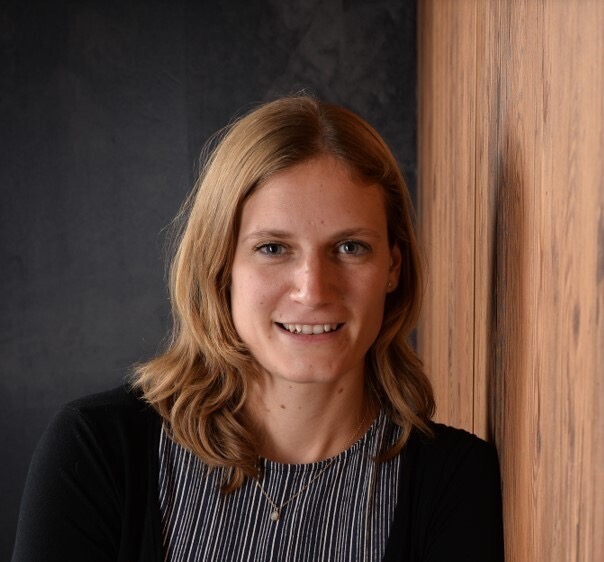
Monika Westphal at the Karlsruhe Institute of Technology
-
Between April and May 2022, Monika Westphal spent one month as a visiting researcher at the Karlsruhe Institute of Technology (KIT), working with Prof. Gerhard Satzger and Dr.-Ing. Michael Vössing on the intersection of Information Systems and Behavioral Science. In an invited talk, she presented her research on “How People’s Perceptions and Behaviors Change as a Response to Information Transparency” to the DSI team.
During her visit, Monika Westphal met with postdocs and doctoral students from the research groups of Prof. Scheibehenne, Prof. Weinhardt, Prof. Mädche, Prof. Nieken, Prof. Nickel, and Prof. Satzger, to identify common research interests and/or discuss open postdoc positions.
The visit was funded by the Karlsruhe House of Young Scientists (KHYS) Aspirant Grant. We would like to thank Mrs. Schmitt and Mr. Hahmann for their support in planning and conducting the research stay.
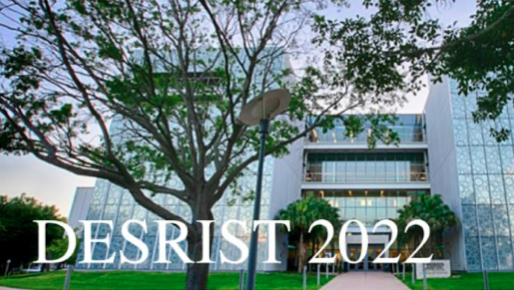
Teilnahme an der International Conference on Design Science Research in Information Systems and Technology (DESRIST)
-
Die Forschungsgruppen der Professoren Mädche, Satzger, Sunyaev und Weinhardt werden mit insgesamt 6 Beiträgen auf der „International Conference on Design Science Research in Information Systems and Technology (DESRIST)“ vertreten sein, die im Juni 2022 in St. Petersburg, Florida, stattfindet. Herzlichen Glückwunsch allen Autorinnen und Autoren!
Blecher, L., Riefle, L., Kauppinen, T.:
Designing Virtual Toolboxes to Guide Educators in Creating Online LearningBluhm, S., Staudt, P., Weinhardt, C.:
Towards Designing Smart Home Energy Applications for Effective UseGnewuch, U., Maedche, A.:
Toward a Method for Reviewing Software Artifacts from PracticeKuhlmeier, F., Gnewuch, U., Luettke, S., Brakemeier, E.-L., Maedche, A.:
A Personalized Conversational Agent to treat Depression in Youth and Young Adults – A Transdisciplinary Design Science Research ProjectOtto, M., Grisold, T., vom Brocke, J., Gau, M.:
Towards Space Mining: A Smart Space Management Solution to Minimize Indoor Spreading Risk of COVID 19Warsinsky, S., Schmidt-Kraepelin, M., Thiebes, S., Wagner, M., Sunyaev, A.: Gamified Expert Annotation Systems: Meta-Requirements and Tentative Design
Mehr über die DESRIST 2022 erfahren:
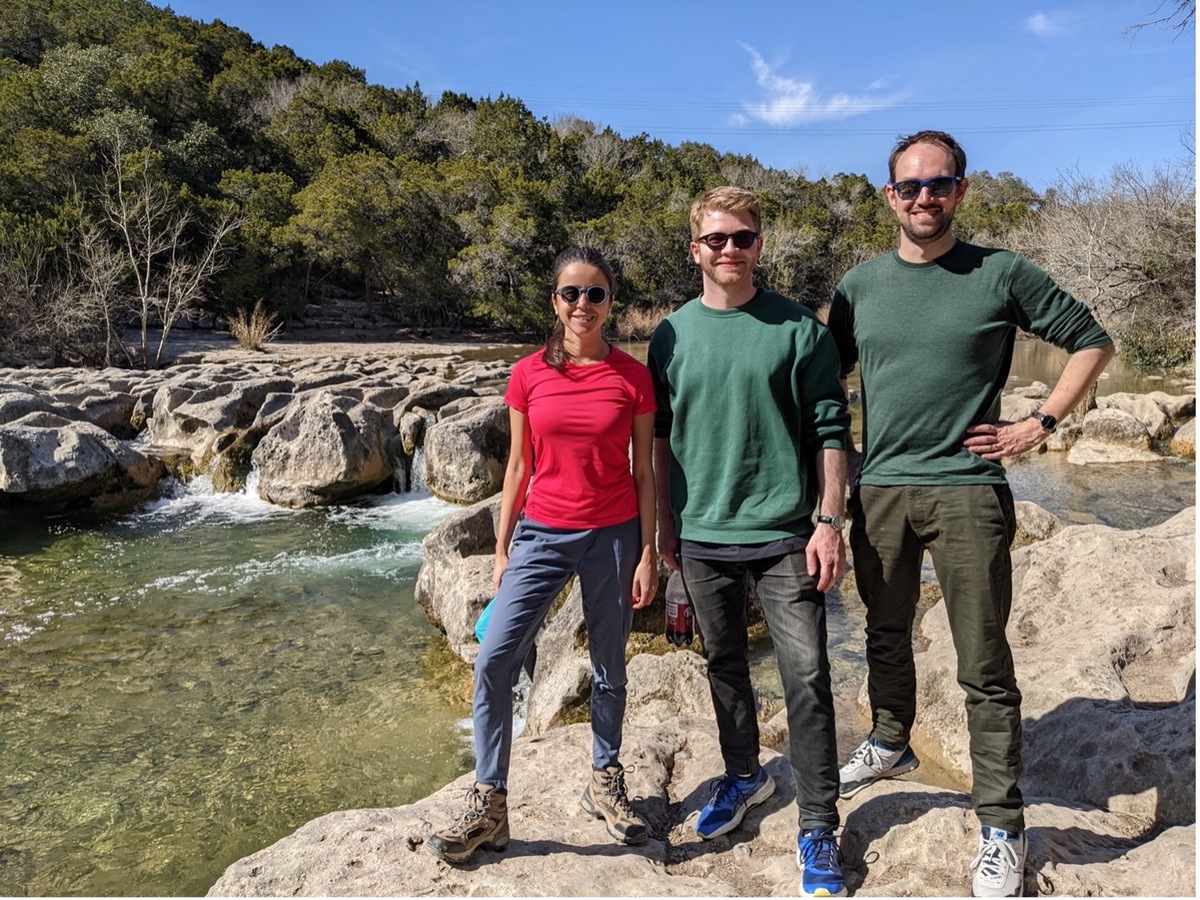
Jakob Schoeffer at the University of Texas at Austin
-
Between January and April 2022, Jakob Schoeffer spent 2.5 months as a visiting researcher at the renowned University of Texas at Austin, working with Prof. Maria De-Arteaga on a project “On the Relationship Between Explanations, Fairness Perceptions, and Decisions.” In this project, Jakob, Niklas Kühl, and Prof. De-Arteaga have been conducting a study to examine how explainable AI (XAI) methods impact (i) people’s fairness perceptions, (ii) their reliance on AI, and (iii) fairness of outcomes in AI-based decision-making settings. Intermediate results of this collaboration have already been accepted for presentation at a workshop at the ACM CHI ’22 conference (link provided); with more results to follow soon. Thank you to Prof. Maria De-Arteaga for being a fantastic host and making this physical collaboration possible!
Schoeffer, J., De-Arteaga, M., & Kuehl, N. (2022). On the Relationship Between Explanations, Fairness Perceptions, and Decisions. Workshop on Human-Centered Explainable AI (HCXAI) @ ACM CHI 2022
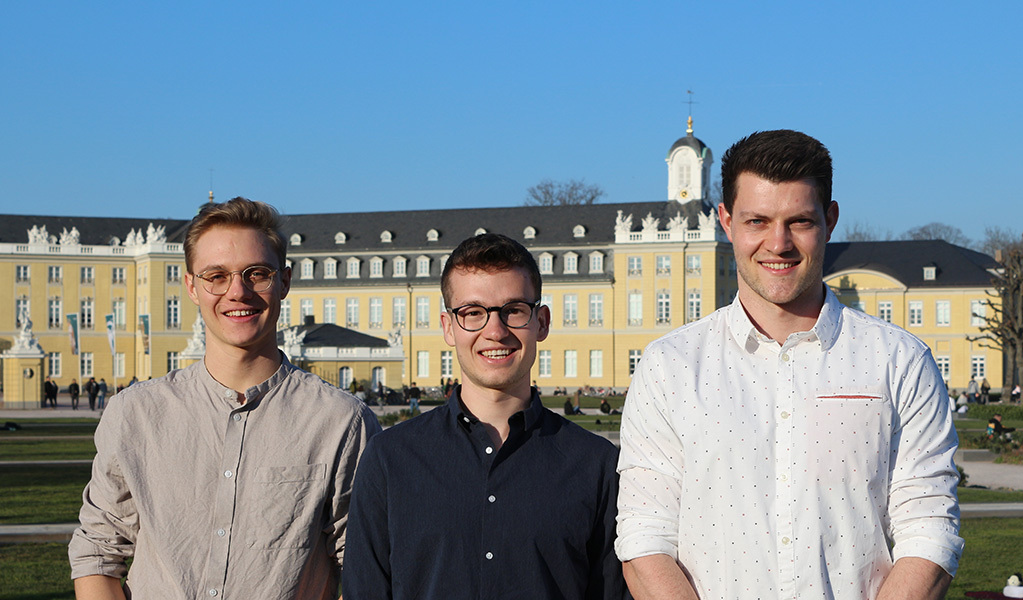
KIT Studierenden-Team in DigitalChangeMaker Accelerator aufgenommen
-
Lukas Dierolf, Luca Dilger und Simon Maier, drei Studierende der Wirtschaftswissenschaftlichen Fakultät am KIT, beobachteten während der Pandemie, dass viele Studierende Schwierigkeiten hatten, zwischen Präsenzveranstaltungen auch Online-Lehrformate wahrzunehmen. Zu wenige Orte auf dem Campus waren dafür zugänglich. Sie beschlossen, selbst eine Lösung zu finden und bewarben sich dazu mit Unterstützung durch KSRI/IISM und Innovation and Relations Management (IRM) für den DigitalChangeMaker Accelerator des Stifterverbands und der Reinhard Frank-Stiftung. Am 07.03.22 erhielten sie die Zusage. Nun geht es ans Werk. Herzlichen Glückwunsch an das Team!
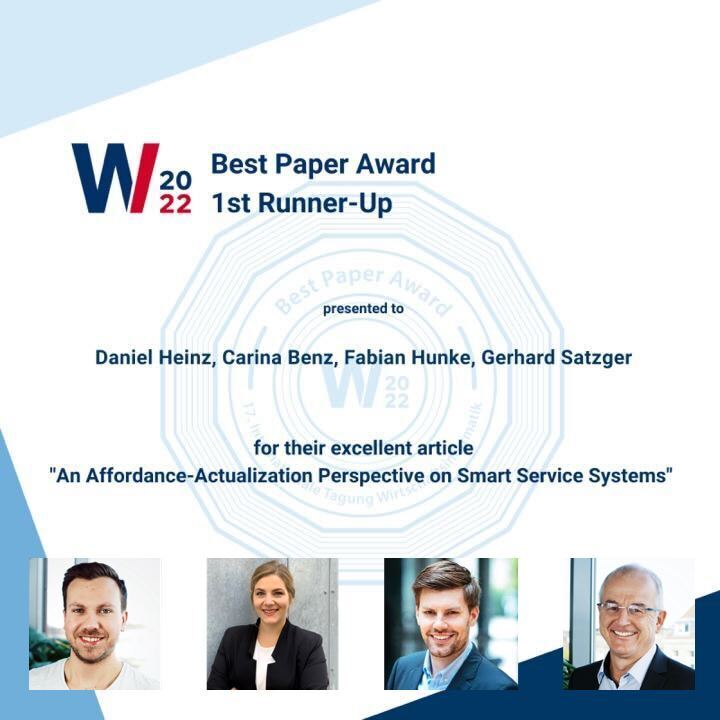
DSI successful at WI 2022
- Date: 25.02.2022
-
Our research group successfully (co-)authored and presented 5 papers at „Internationale Tagung Wirtschaftsinformatik (WI22) – see below.
In particular, we congratulate the team around Daniel Heinz which ranked second for the Best Full Paper Award with their work on smart service systems!
Noteworthy for our talented students: Jan Bode and team were able to place a paper in the student track, and last year’s terms “team project” team led by Lara Riefle turned their work into an academic contribution!
Congratulations to all authors – well done !!
Regular/short papers:
Heinz, D., Benz, C., Hunke, F., Satzger, G.:
An Affordance-Actualization Perspective on Smart Service SystemsJakubik J., Blumenstiel, B., Vössing, M., Hemmer, P.:
Instance Selection Mechanisms for Human-in-the-Loop Systems in Few Shot LearningRiefle, L., Brand, A., Mietz, J., Rombach, L., Szekat, C., Benz, C.:
What Fits Tim Might Not Fit Tom: Exploring the Impact of User Characteristics on Users’ Experience with Conversational Interaction ModalitiesSterk, F., Peukert, C., Hunke, F., Weinhardt, C.:
Understanding Car Data Monetization: A Taxonomy of Data-Driven Business Models in the Connected Car DomainStudent Track:
Bode, J.; Schemmer, M.; Balyo T.
Explainable AI for Constraint-Based Expert Systems

New Member of the DSI Team: Philipp Spitzer
- Date: 01.02.2022
-
Philipp Spitzer graduated from Karlsruhe Institute of Technology (KIT) with a bachelor’s and master’s degree in Industrial Engineering and Management. As part of his master’s degree he worked as a research assistant at the Energy Production and Innovation Center at University of North Carolina in Charlotte, USA. In 2019, Philipp started to work for Fujitsu as a Data Scientist, where he focused his work on applying his machine learning skills in real-world scenarios to optimize production sites. After almost two and a half years working for Fujitsu, Philipp returned to KIT joining the research group Digital Service Innovation (DSI). In DSI, he is striving within the Applied AI in Services team towards his PhD in cooperation with Trelleborg Sealing Solutions Germany GmbH. He focuses his doctorate on applied machine learning, human-computer collaboration and knowledge retention.

